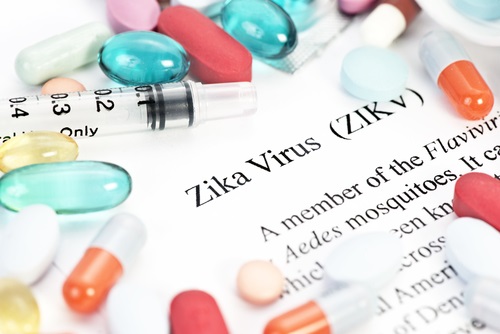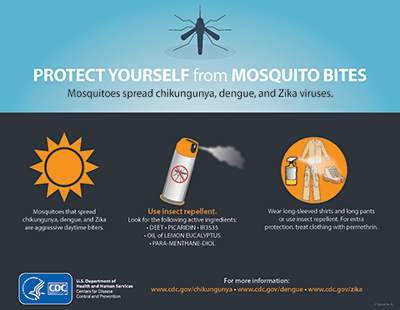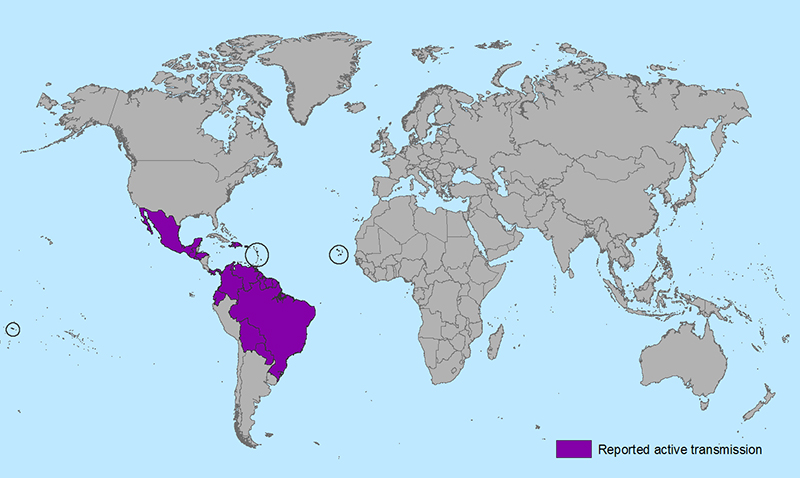Zika has been making headlines lately, and for good reason. The virus, primarily transmitted by the Aedes aegypti mosquito, has been linked to miscarriages and birth defects. The WHO declared a Public Health Emergency for International Concern and the CDC issued an Alert – Level 2 for travelers to affected areas. Want to know if you’re at risk for the disease during your next trip and how to stay safe? Our Chief Medical Officer, Dr. Robert Wheeler, weighs in with some facts about the Zika virus as well as some preventative advice below.

What is the Zika virus and how is it transmitted?
The primary mode of transmission for the Zika virus is from the bite of an infected Aedes aegypti mosquito. Other potential modes of transmission are from a woman to her unborn baby during pregnancy and childbirth, via transfusion of infected blood, and from sexual contact. This disease is similar to Chikungunya and Dengue Fever.
What are the symptoms of Zika?
- High Fever
- Rash
- Muscle Pain
- Headache
- Conjunctivitis
How is Zika diagnosed?
Typically, the Zika virus can be diagnosed with specific blood tests, within a week after onset of symptoms.
How is Zika treated?
In most cases, Zika infections are self-limited, as with the flu. The WHO advises infected travelers to rest, drink fluids and treat any pain with over the counter medications. If symptoms worsen for any reason, travelers should seek prompt medical attention.
Who is at risk?
Anyone exposed to mosquitos in affected areas is at risk for contracting the Zika virus. Although only 1 in 5 people infected with the Zika virus actually become ill with symptoms from the infection, there is an additional risk to women who are pregnant or may become pregnant within a month of departing from an affected country. The Zika virus can be transferred from a mother to her unborn baby resulting in miscarriage or the birth defect microcephaly (small head and brain). Doctors are urging expectant mothers to avoid or postpone all unnecessary travel to affected areas. The paralytic neurological disorder, Guillain-Barré syndrome has also been associated with the Zika virus.

Can Zika be prevented?
The best way to prevent the disease is to avoid any mosquito bites while traveling in an affected region.
Is there a vaccine for Zika virus?
There is no vaccine for the Zika virus, but researchers are currently looking into the creation of one.
How can I protect myself from getting Zika virus when traveling?
The best advice to prevent any mosquito-borne illness is to wear repellant that contains DEET, picaridin, oil of lemon eucalyptus, or IR3535. Permethrin is an additional insect repellant that can be applied to clothing, footwear, mosquito nets and tents, but not directly onto bare skin. Keep skin covered with long-sleeved shirts and long pants. If possible, stay limit your amount of outdoor activities, especially between the hours of dawn until dusk, when the Aedes aegypti mosquito is most active.
Important: If you’re traveling and begin to feel ill, don’t wait for symptoms to worsen—seek medical care as soon as possible. On Call members have access to worldwide medical referrals and our nurse helpline, 24 hours a day, 365 days a year.

Countries and territories with active Zika virus transmission.
Zika is an evolving news story; be sure to check with trusted sources such as your travel risk management provider, the CDC, State Department and WHO for the most up-to-date information on the Zika Virus.
Zika map and mosquito chart from the Centers for Disease Control.
Safe Travels!


